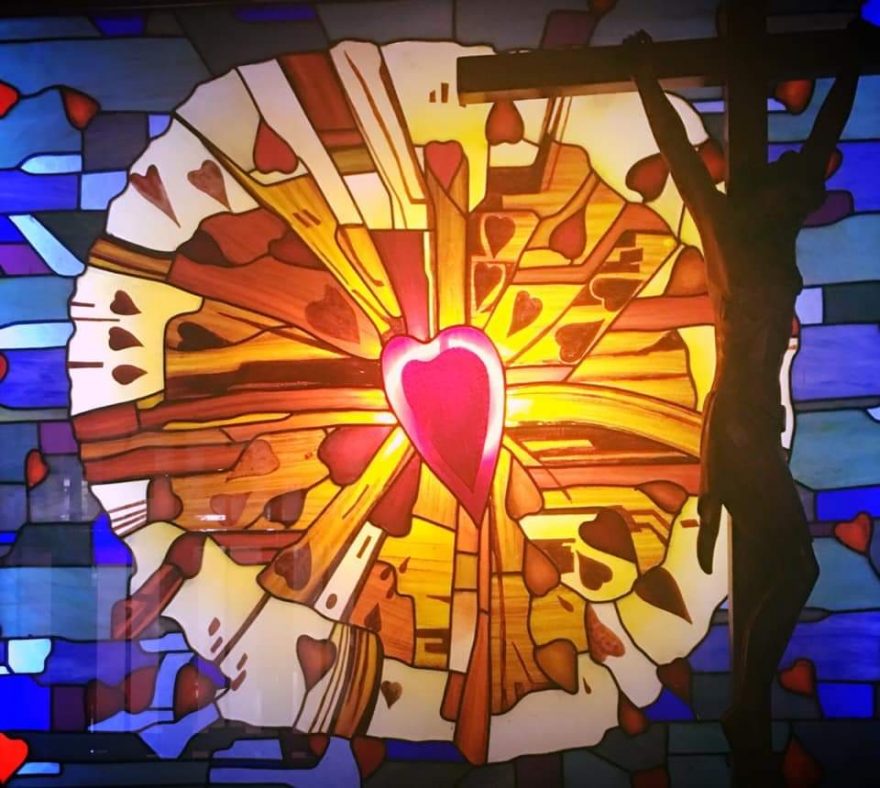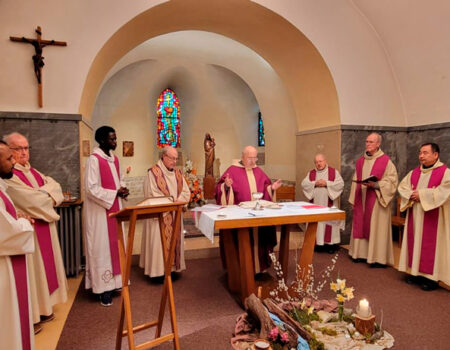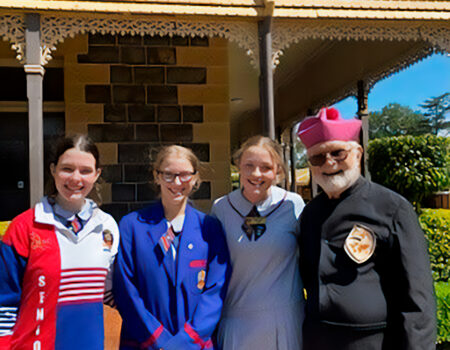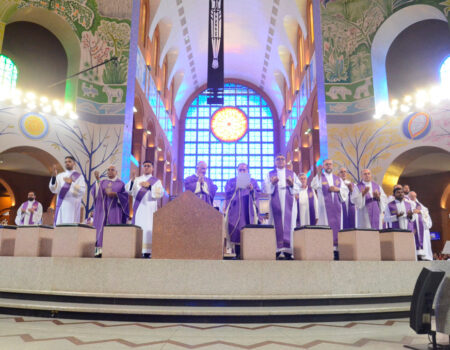Discerning our Spirituality of the Heart in the 21st. Century
Tuesday August 17, 2021

June, 2019
“To be loved by Jesus enlarges our heart capacity. . . . When you have been included in the spaciousness of divine love, there is just no room for human punishment, vengeance, rash judgement, or calls for retribution. . . . it is more about waking up than cleaning up.”
This opening quote from the Franciscan spiritual theologian, Richard Rohr (The Universal Christ, 2018), provides the context for the reflections I offer on our MSC charism for the 21st century. It strikes me that we still face a major challenge in discerning the distinction between Devotion to the Sacred Heart, and Spirituality of the Heart. We like to hold on to both, and certainly I support the kind of theological and spiritual integration that would make that possible. My sense, however, is that two types of value-radiation are at stake, and one has stronger Biblical roots than the other.
The Devotion of Consolation
The devotional approach features strongly in those parts of our world where poverty, suffering, and oppression prevail, and people cry out to God for relief and deliverance. This often results in petitionary prayer, multiplying
novenas and devotions, in the hope that we can convince or persuade God to come to our rescue. Such beseeching is often done within the joy filled atmosphere of festivals, fiesta, and processions. The euphoric atmosphere – at least temporarily – enables people to rise above the struggle and pain of daily existence. In some extreme cases, the devotions assume a martyr-like zeal, as in parts of the Philippines whereby people nail fellow humans to Crosses on Good Friday.
I don’t wish to make light of such devotional practices because they are often what keep people going in the face of awful anguish and suffering, and they provide a kind of reassurance, comfort, and consolation without which life indeed would be unbearable. However, there are three foundational elements that need a deeper quality of discernment:
a) That suffering and hardship in this life will provide us with a greater chance of eternal happiness after death; that is not incarnational Christian theology.
b) There also prevails a kind of spiritualism that upholds the idea that suffering for the sake of suffering is a good thing; Jesus never suggested or promoted this idea. c) While undoubtedly popular devotions alleviate anguish and bring a degree of meaning and hope, usually such devotions contribute nothing to bringing about Gospel liberation, and thus pave the way for justice-based deliverance from poverty, sickness, and oppression.
The Spirituality of Liberation
For every Congregation with a spirituality such as ours, we face what is essentially a theological challenge with substantial implications for both lifestyle and ministry. The Spirituality of the Heart begins – as does my introductory quote – with the unambiguous declaration that we are loved unconditionally by our God. Irrespective of what may be our personal sin or unworthiness, our social maginalization, or our economic deprivation, we are loved unconditionally. Bombarding such a God with persistent prayers and penance comes dangerously close to being a form of idolatry.
Next comes the major challenge: If I am loved unconditionally, then I am called and missioned to love all others unconditionally as well. Today, the “others” must include creation at large and all the creatures with whom we share earth’s habitat. It is this response of loving unconditionally that requires an option for eco-justice, seen today as a central biblical and theological dimension of our Christian faith.
Instead of beseeching God to rectify our human plight, God in Jesus has already called and empowered us to do it for ourselves. The Scripture scholar, John Dominic Crossan (The Greatest Prayer, 2010), expresses the challenge thus: while we are waiting on God’s intervention, God is actually waiting for our collaboration. As co-disciples with Jesus we are entrusted with the task of bringing about heaven on earth. We are the body of Christ on earth today. The heart of Christ can only transform the heartlessness of our world through our heart-full endeavours. Our prayer and devotion must be of a type to prepare us for, and sustain us in, that missionary enterprize.
The Biblical and theological foundation for this understanding of mission is the Gospel notion of the Kingdom of God, which in many of my own writings I translate as the Companionship of Empowerment. For Jesus this was the primary vision of hope and new life, and for every disciple it is what we should be seeking first (cf. Matt. 6:33: “Seek FIRST the Kingdom of God . . .”). This is the primary theological foundation for our Spirituality of the Heart, illustrated vividly in that key word: compassion
Empowering Compassion
Compassion literally means: “to suffer with.” However, as many MSCs will know, it has a richer, deeper meaning. From the Greek, splangnezomai (splangna means guts or entrails), it is characterized by a deep embodied, visceral identity with the suffering one, to a point where the suffering becomes intolerable and one feels compelled to take the necessary action to bring about change – through an option for empowering justice. In the original Greek of the Gospels, splangnezomai is always a verb when applied to Jesus. It does not denote merely feelings of love and concern; rather it evokes a need to become proactive in seeking justice, augmenting liberation, and delivering personal and systemic empowerment.
In this empowering spirituality there is obviously a fine balance that requires a depth of both personal and communal discernment. The heart we draw our strength and guidance from is the heart of Jesus himself. This requires the interior journey of prayer and contemplation. This is the source of our wisdom and guidance. And from this wellspring comes the Gospel sending forth, not simply to preach and teach (the emphasis of the past) but to become the missionary catalysts to bring about what our former Superior General, Eugene Cuskelly, one time described as “A New Heart for New World.”
This is a mission we cannot undertake on our own. In the complex world of the 21st century it requires a concerted and collaborative strategy, incorporating a range of different skills and gifts:
* systemic (social/political);
* legal (as we try to confront the ravaging exploitation of modern globalization);
* economic (to engage the luring commercialization of today’s world);
* media ( most values are perpetuated through media propaganda);
* networking with those several agencies which bring about change from the ground up.
Bringing heart to a heartless world – our mal modern – can only be achieved in a very limited way through our traditional clerical-based ministries. We need an enlarged and expanded sense of vocation. Perhaps more daunting, we need an openness and readiness to collaborate with a vast range of lay colleagues – in areas where we will be challenged to outgrow the old dualistic split between sacred v. secular. And many such collaborators will not be Catholic, perhaps not even Christian. Nor should that matter as long as their hearts are on fire with the liberating and empowering vison of the Kingdom of God.
A Heart on Fire!
As a Congregation, discerning our way through the 21st century, we acknowledge our past as a predominantly clerical inheritance, serving the mainline Church. If we are to undergo the grace of being refounded, we will need to undergo a transformative conversion. It is not so much a case of going back to the vision of Fr. Chevalier, but rather discerning the quality of response he would make if he were alive today. What fire of the heart would awaken his founding zeal today and how would he translate it into an empowering vision? In his own day he employed devotions in negotiating our original founding. My sense of the history of Religious Life suggests that he would employ a different strategy in our time, one which quite likely would embrace several features of the Spirituality of liberation as outlined in this article.
By Diarmunid O´Murchu (Irish Province)





